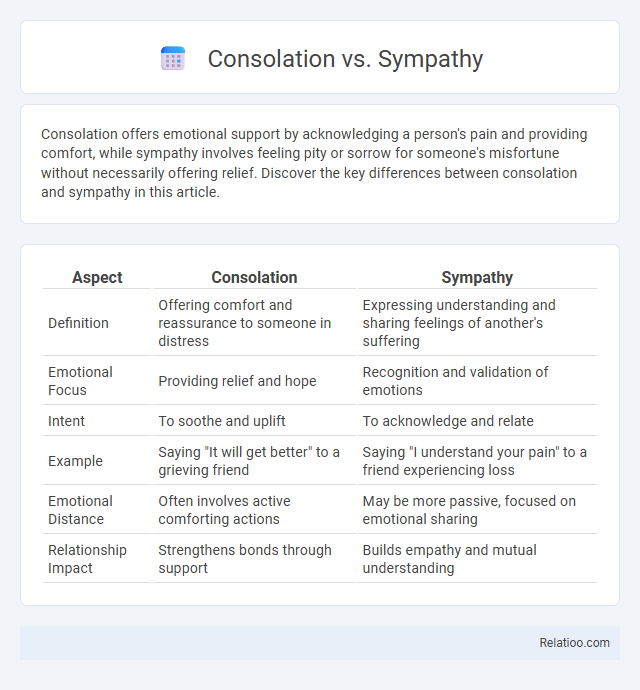Consolation offers emotional support by acknowledging a person's pain and providing comfort, while sympathy involves feeling pity or sorrow for someone's misfortune without necessarily offering relief. Discover the key differences between consolation and sympathy in this article.
Table of Comparison
| Aspect | Consolation | Sympathy |
|---|---|---|
| Definition | Offering comfort and reassurance to someone in distress | Expressing understanding and sharing feelings of another's suffering |
| Emotional Focus | Providing relief and hope | Recognition and validation of emotions |
| Intent | To soothe and uplift | To acknowledge and relate |
| Example | Saying "It will get better" to a grieving friend | Saying "I understand your pain" to a friend experiencing loss |
| Emotional Distance | Often involves active comforting actions | May be more passive, focused on emotional sharing |
| Relationship Impact | Strengthens bonds through support | Builds empathy and mutual understanding |
Understanding Consolation and Sympathy
Consolation involves offering comfort and reassurance to someone experiencing distress, often through empathetic words or actions that address emotional pain. Sympathy refers to the recognition and expression of concern for another person's suffering, acknowledging their feelings without necessarily providing direct emotional relief. Understanding the distinction between consolation and sympathy helps in effectively supporting individuals by either actively soothing their distress or simply validating their experience.
Definitions: What Is Consolation?
Consolation refers to the comfort or solace provided to someone experiencing grief or disappointment, often through empathetic understanding and supportive words or actions. Sympathy involves recognizing and acknowledging another person's emotional hardships, offering feelings of compassion without necessarily providing direct comfort or relief. While consolation aims to alleviate distress by offering reassurance, sympathy primarily expresses shared feelings of sorrow or concern.
Defining Sympathy in Emotional Support
Sympathy in emotional support involves recognizing another person's distress and expressing care or concern without necessarily sharing their feelings directly. It differs from consolation, which specifically aims to comfort and alleviate sorrow, and from empathy, which requires deeply understanding and vicariously experiencing another's emotions. Defining sympathy emphasizes acknowledging pain while maintaining a certain emotional distance, often through verbal expressions of compassion.
Key Differences Between Consolation and Sympathy
Consolation involves offering comfort to someone experiencing grief or distress, often through supportive actions or words that help alleviate their emotional pain. Sympathy refers to recognizing and expressing understanding or pity for another person's suffering without necessarily providing direct comfort or solutions. Your ability to distinguish between consolation and sympathy enhances empathetic communication by knowing when to actively soothe versus simply acknowledge feelings.
The Role of Empathy in Consolation
Empathy plays a crucial role in consolation by enabling you to genuinely understand and share another person's feelings, fostering a deeper emotional connection. While sympathy involves acknowledging someone's pain from a distance, consolation requires an empathetic response that offers comfort and support tailored to their unique experience. This empathetic engagement transforms mere acknowledgment into meaningful consolation that helps alleviate distress.
Common Situations for Consolation vs Sympathy
Consolation typically occurs when you offer comfort and reassurance to someone experiencing deep personal loss or grief, such as after the death of a loved one or during serious illness. Sympathy involves expressing understanding and concern in situations like hearing about a colleague's disappointment or a friend's minor setbacks. Your choice between consolation and sympathy depends on the intensity of the situation and the emotional support the person needs.
Benefits of Offering Consolation Over Sympathy
Offering consolation provides deeper emotional support by actively addressing and soothing Your pain rather than just recognizing it, fostering a stronger sense of comfort and healing. Consolation involves empathetic actions that help rebuild confidence and hope, unlike sympathy, which may create distance by merely expressing pity. Providing consolation strengthens connections and promotes emotional resilience through meaningful engagement and reassurance.
Pitfalls of Misapplying Sympathy
Misapplying sympathy often leads to emotional distancing or superficial comfort, which can hinder genuine connection and support. Unlike consolation, which focuses on offering solace through understanding and reassurance, misplaced sympathy may evoke pity that makes recipients feel belittled or misunderstood. Recognizing the difference between sympathy's potential pitfalls and the empathetic nature of true consolation is essential for fostering meaningful emotional healing.
How to Choose the Right Response
Choosing the right response between consolation, sympathy, and empathy depends on understanding the emotional needs of the person you are addressing. Consolation involves offering comfort and reassurance after a loss, sympathy expresses sorrow or concern for someone's misfortune, and empathy requires actively sharing in and acknowledging the other person's feelings. Your ability to discern when to simply acknowledge pain versus when to provide active emotional support will guide you in delivering the most appropriate and heartfelt response.
Building Stronger Relationships Through Consolation and Sympathy
Building stronger relationships through consolation and sympathy involves genuinely understanding and responding to others' emotions. Consolation provides comforting support that eases pain, while sympathy expresses shared feelings of sorrow, fostering emotional connection. By offering your empathetic presence, you create trust and deepen bonds that strengthen interpersonal relationships.

Infographic: Consolation vs Sympathy
 relatioo.com
relatioo.com